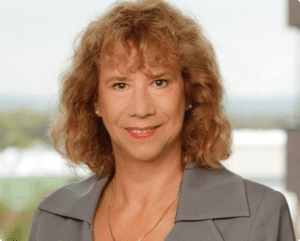Prof. Dr. Katharina Morik
Professor of Computer Science at TU Dortmund University
»Networking with other startups or already established AI companies is very straightforward in the Ruhr district«
Katharina Morik is a professor at the Chair of Artificial Intelligence at TU Dortmund University. We asked her, among other things, what traditional industrial companies from the Ruhr region can expect from AI and what the energy transition has to do with it.

What would be the typical way for companies of the Ruhr district to benefit from artificial intelligence?
Industrial production is a successful application area for machine learning. In addition to »predictive maintenance« and plant-wide quality management, processes are now even being optimized directly. The knowledge of engineers is supplemented by the analysis of data, so that it is recognized at an early stage during a process whether the required quality can be achieved and, if necessary, suitable measures are taken in real-time. There is enormous potential for savings here, especially in energy- and resource-intensive plants. New work brings simulation and machine learning together, so that simulation is improved on the one hand and learning on the other. Prerequisites for successful applications are a good data situation and in-house support for the use of machine learning.
What other areas do you think of where AI technology can help make a positive impact on the energy transition?
In the mobility industry, for example, which is all about the efficient transport of goods and people. Here, the first question is whether physical transport is necessary or can be replaced by a more efficient organization of supply chains or communication processes. The vehicle of transport is determined on the one hand by the number of people or the volume of goods to be moved from one place to another at a given time. There is latitude in both the location and the timing. Demand forecasts can be machine-learned from traffic and telecommunication data and used directly for route planning of different traffic models. In the public transport network, even different but pedestrian start and destination stations can be recommended and special features such as accessibility can be taken into account. On the other hand, the resource requirements of a vehicle determine the selection. For an economy of sharing, real-time supply and demand can be mediated in terms of sustainability, e.g., for cabs, autonomous vehicles, or logistics fleets. Here, distributed machine learning and so-called bandit models are current research topics. Machine learning predictions enable the organization of the circular economy of transport and logistics in the Internet of Things.
Why should young AI startups working in the field of climate and mobility settle in the Ruhr region?
The University Alliance Ruhr (TU Dortmund University, Ruhr University Bochum and University Duisburg-Essen) trains outstanding young talent. With its Center for Entrepreneurship & Transfer (CET), TU Dortmund supports students and scientists in developing a start-up plan and helps them get started with advice, space and training. The Technology Center Dortmund with 350 companies, universities and research institutes offers an interesting environment. Networking with other startups or already established AI companies is very straightforward in the Ruhr region. Supportive collegiality prevails at meetups or similar gatherings.
Prof. Dr. Katharina Morik established the Chair of Artificial Intelligence at TU Dortmund University in 1991 with a focus on machine learning and data mining. The globally successful tool RapidMiner originates from her company. In 2011, she recruited the Collaborative Research Center 876 »Information Retrieval by Analysis under Resource Constraints« of which she is the spokesperson. Machine learning is being investigated in 12 basic projects ranging from statistics to computer architecture. Together with Prof. Wrobel, she leads the Competence Center for Machine Learning Rhine-Ruhr (ML2R) and coordinates the German competence centers and their cooperation with the French ones. Together with Prof. Markl, she leads WG 1 »Technological Pioneers« of the Learning Systems Platform. She is a member of the Academy of Science and Engineering, acatech, and the North Rhine-Westphalian Academy of Sciences and Arts, and a Fellow of the German Informatics Society.